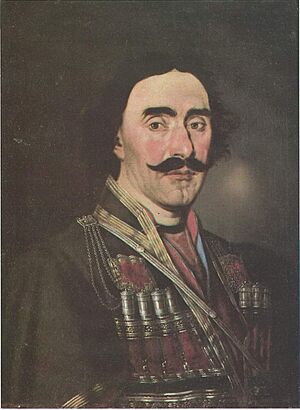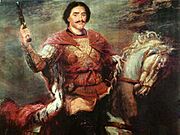Solomon I facts for kids
Quick facts for kids Solomon I |
|
|---|---|
 |
|
| King of Imereti (more...) | |
| Reign | 1752–1784 |
| Predecessor | Alexander V of Imereti Teimuraz of Imereti |
| Successor | Teimuraz of Imereti David II of Imereti |
| Born | 1735 |
| Died | 1784 (aged 48–49) |
| Dynasty | Bagrationi dynasty |
| Father | Alexander V of Imereti |
| Mother | Tamar Abashidze |
| Religion | Georgian Orthodox Church |
| Khelrtva |  |
Solomon I the Great (Georgian: სოლომონ I დიდი) was a powerful king of Imereti (western Georgia). He was part of the Bagrationi Dynasty. He ruled from 1752 to 1765 and again from 1767 until his death in 1784.
Before Solomon became king, Imereti was in a very difficult state. For almost 100 years, there was a lot of trouble. The Ottomans had soldiers in Imereti's castles. They also demanded payments. The king and the nobles often fought each other. There was also a terrible slave trade. All these problems made the country very chaotic.
Contents
King Solomon's Early Reign
In 1752, when he was just 17, Solomon I became king after his father, Alexander V. He wanted to bring peace and order back to Imereti. But some powerful nobles and even his own family members were against him. They included Mamia Gurieli and his uncles. His mother, Tamar, also opposed him.
Solomon had to flee for a short time. But he soon returned with help from the Ottomans. He then worked to make his royal power stronger. He sent his mother away and put his uncles in prison. He also took back property from his grandfather. To gain more support, he married Mariam, who was the sister of a strong ruler from Mingrelia.
How King Solomon Strengthened His Kingdom
Imereti was very poor because of the Ottoman invasions. The country could not even pay its taxes. One of the main ways people made money was through the slave trade. This was especially true for Georgian women. Solomon wanted to change this. He followed the lead of other Georgian kings, Teimuraz II and Heraclius II. He worked to help farming and bring people back to the countryside.
Solomon also gave land and people back to the church. He made sure church workers did not have to pay taxes. This helped him gain the church's trust. He also created a new group called "Sworn Men." Every year, these men would meet and promise to be loyal to the king. They would also provide soldiers if there was a war. This group helped the king make his power even stronger.
Fighting Against the Slave Trade
At first, Solomon did not openly fight the Ottomans. But once he brought some order to his country, he declared war on the slave trade. This was a big challenge to the Ottomans. The slave trade was a huge business. Many Imeretian nobles and Turkish soldiers were involved. A lot of Imereti's money came from selling people.
Because of this, both the Ottomans and some nobles were against Solomon's ban. Solomon knew he had to get rid of the Ottomans to stop the slave trade. So, he secretly prepared for war. For the first time in a long while, the rulers of Mingrelia and Guria joined him. The people of Imereti also stood with their king.
The Battle of Khresili
In December 1757, Solomon chose Khresili as the battlefield. This is where the main Ottoman forces were gathered. On December 14, 1757, a big battle took place. Imereti won a great victory. This was a major step for Solomon.
Even after this win, the Ottomans still threatened Solomon. He agreed to pay taxes to them but refused to allow the slave trade. The Pasha of Akhaltsikhe, Haji Ahmed, responded by letting his soldiers attack the Gelati monastery. Solomon went to complain. The Pasha sent 3,000 soldiers with Solomon, pretending to help. But Solomon's "Sworn Men" killed all the Turkish soldiers before they crossed the border. Because of this failure, the Ottoman Sultan had Haji Ahmed killed.
In 1759, a new Pasha, Ibrahim, took over. Solomon sent his wife, Queen Mariam, to talk about a peace deal. But the talks failed because the Pasha still wanted to continue the slave trade. In 1758, Solomon I, Heraclius II, and Teimuraz II signed a treaty to help each other.
Important Reforms and Church Council
On December 4-5, 1759, Solomon held a special meeting. Leaders from the church and nobles from western Georgia attended. They talked for a month about the country's problems. At this meeting, everyone agreed to obey the king of Imereti. They also agreed to stop the slave trade.
The meeting also made other important decisions. Solomon made the Church a strong part of his government. He brought back the bishopric of Kutaisi and gave it land. He returned people and lands to the church. Church workers were also freed from taxes. This helped make the church stronger and more loyal to the king.
Ottoman Attempts to Overthrow Solomon
As Solomon grew stronger, the Ottomans tried harder to remove him. In 1763, Solomon defeated another Ottoman army of 13,000 men. But in 1765, the Ottomans invaded Imereti with an even bigger army. They defeated Guria, Racha, and Mingrelia. Solomon had to flee from Kutaisi.
The Ottomans put Solomon's nephew, Teimuraz, on the throne. Teimuraz agreed to allow the slave trade. But the Ottomans found it too expensive to keep 45,000 soldiers in Imereti. So, in 1766, they agreed to a truce. Solomon asked Heraclius II to help him talk with the Ottomans. Solomon formally agreed to send 60 girls each year as a payment. The Ottomans did not demand they had to be Georgian. They also recognized Imereti as a protected state, not a vassal state. However, Solomon never sent any girls. His nephew Teimuraz continued to fight him. But in 1768, Solomon defeated Teimuraz in a battle. Teimuraz was captured and died in prison.
Russian Help and Fortresses
Russia's Empress Catherine II sent a small army to help Georgia. In September 1769, this army, led by General Totleben, came to Imereti. Georgian and Russian soldiers surrounded Shorapani Castle. But Solomon had to leave when he heard that the Turks and Dadiani were attacking Imereti. Totleben then left Shoropani and went to Kartli.
In 1770, more Russian soldiers arrived, about 4,000 in total. Heraclius II joined the war. After a battle where Totleben did not participate, the Russian army moved to Imereti. This time, Totleben helped Solomon. Their combined armies captured the fortresses of Tsutskhvati, Shorapani, and Baghdati. On August 6, they also took the Kutaisi fortress. However, Totleben's actions sometimes caused problems between him and Solomon.
The Battle of Chkheri
The Pasha of Akhaltsikhe kept sending soldiers to attack Georgia. In 1773, Solomon I and Heraclius II made a treaty to fight the Ottomans together. In 1774, after the Russian troops left, the Pasha of Childir sent 4,000 soldiers to Imereti. He also encouraged Dadiani and the prince of Abkhazia to attack Solomon.
But the Turks realized their mistake and started to retreat. On February 6, a small but important battle happened at Chkheri. Imeretian soldiers ambushed the enemy. Solomon's troops attacked from behind. The Ottomans lost 1,000 soldiers, and 600 were captured. About 1,400 Ottomans were killed in total.
Peace Treaty and Continued Fights
In November 1774, Solomon I sent an ambassador to Russia. He asked Empress Catherine II to make Imereti a Russian protectorate. But by this time, a peace treaty called the Küçük–Kainarca treaty had already been signed. This treaty said that Russia recognized the Ottomans' right to Western Georgia. However, the Ottomans could no longer take slaves from Imereti. They also had to forgive any Imeretians who had fought them. The Ottomans could not harm Christians either.
Despite the treaty, the Ottomans continued to attack. In 1779, a large army of different groups invaded Mingrelia. Katsia II Dadiani asked Solomon I for help. Solomon quickly moved his army to Mingrelia. Together with Dadiani, they won a big victory at Rukhi Castle. This victory stopped the Turks from expanding into Georgia from the northwest for a long time. However, the Ottomans then started organized attacks on Imereti from other areas.
Solomon's Last Years and Death
Solomon I did not have a son who could take over as king. His son Alexander died in 1780. Solomon knew that after he died, there would be a fight for the throne. In 1783, he told Heraclius II that he wanted his nephew, who was also Heraclius II's grandson, to be the next king. This nephew later became Solomon II. Solomon hoped this would unite Imereti with Kartli-Kakheti.
To stop Ottoman attacks, Solomon I marched to Kvemo Guria several times. On March 9, 1784, he fought a big battle to free the region. His army cleared the areas of Kobuleti and Chakvi from enemy troops. But the Ottomans learned about his movements from his enemies. They attacked Solomon's forces from behind, and his army was defeated. As a result, Kvemo Guria stayed under Ottoman control for another century.
On April 23, 1784, Solomon I died on his way to a festival. He was buried at the Gelati Monastery. The Georgian Orthodox Church recognized him as a saint on December 22, 2016. His feast day is April 23.
Family Life
Solomon I was married three times. His first wife was Princess Tinatin Sharvashidze. His second wife was Princess Mariam, the daughter of Otia Dadiani. His third wife was Princess Gulkan Tsulukidze.
He had five children:
- Prince David, from his first marriage.
- Prince Alexander (1760–1780), from Mariam Dadiani. He led a revolt against his father in 1778.
- Princess Darejan (1756–1827), from Mariam Dadiani. She married Prince Kaikhosro Abashidze.
- Princess Mariam (1769–1845), from Mariam Dadiani. She married Prince Elizbar Eristavi of Ksani.
- Prince Bagrat, an extramarital son.
Images for kids
 | John T. Biggers |
 | Thomas Blackshear |
 | Mark Bradford |
 | Beverly Buchanan |




